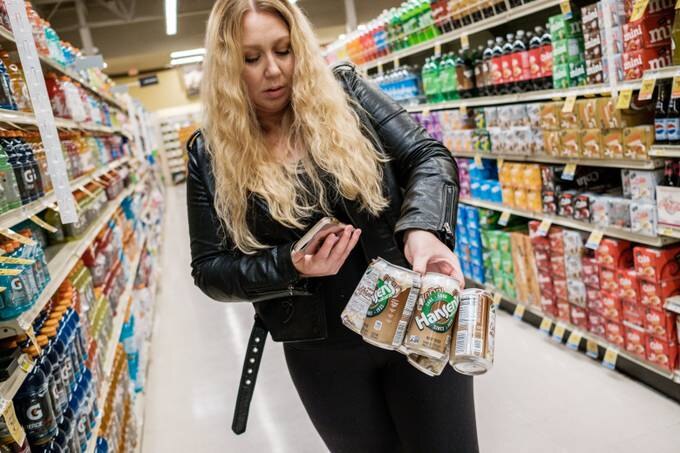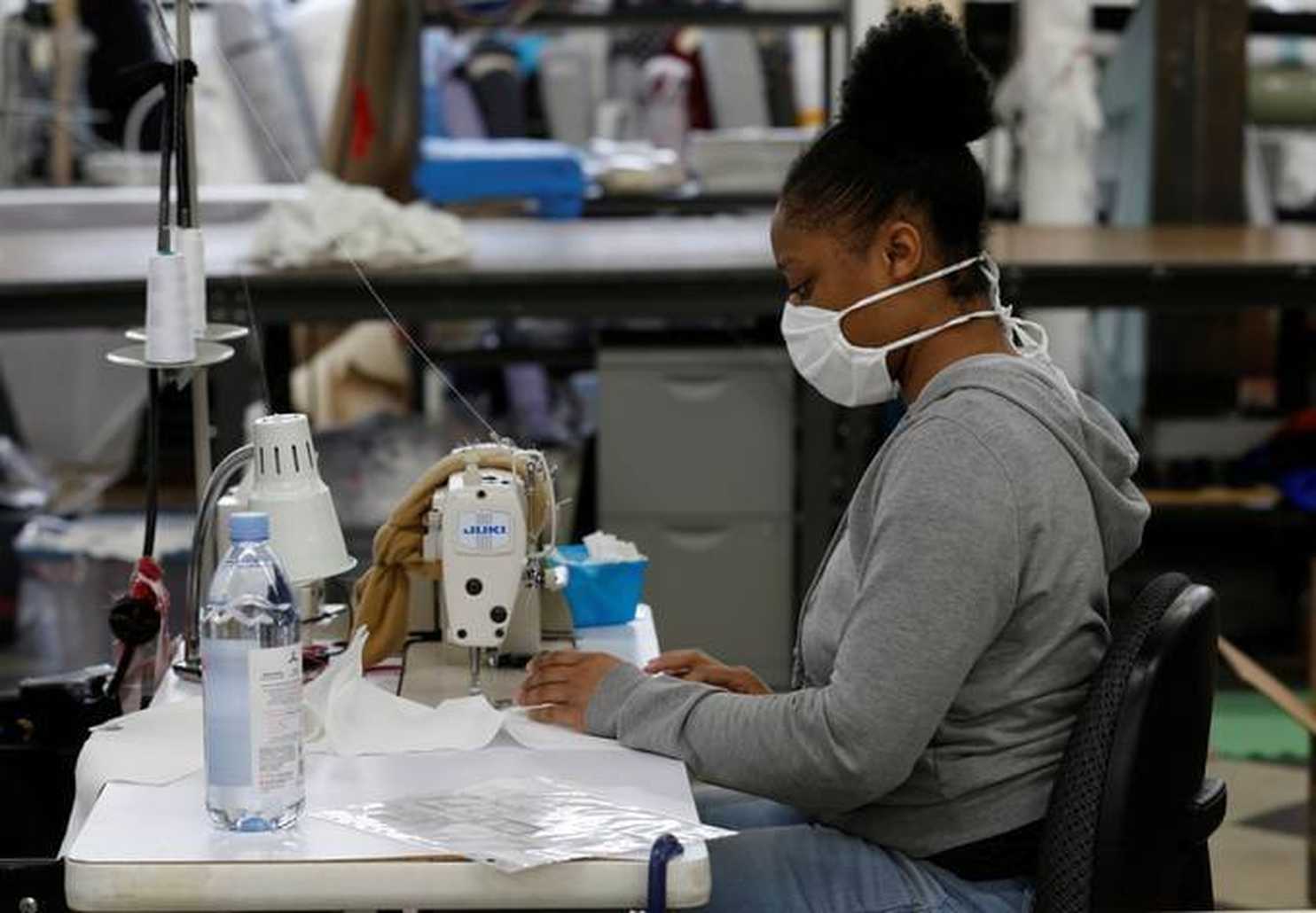Monika Marie sews hospital masks on the first day of turning the “Detroit Sewn” facility into a production facility for hospital masks, in Pontiac, Mich., on Monday. (Rebecca Cook/Reuters)
Ctrl + N
Start-up leaders and tech investors are throwing their weight behind responses to the novel coronavirus, from funding potential covid-19 treatments to surfacing much-needed protective gear for health-care workers.
“This is tech’s social awakening moment,” Roy Bahat, the head of the venture capital firm Bloomberg Beta, told me. “Some people in tech are emerging in tech as genuine heroes and others are trying their best.”
Sam Altman, the chief executive of Open AI, tells me he’s funding nonprofits and companies developing therapeutics and vaccines to fight the virus. The former president of the prominent start-up program Y Combinator said he’s received hundreds of pitches after posting earlier this month a broad call-out for ideas to respond to the pandemic.
Flexport, a major logistics start-up, is collecting donations to cover the costs of sourcing and shipping supplies related to the pandemic. The company last week donated 60,000 surgical masks, 34,000 gloves, 2,000 surgical gowns and 50 thermometers to San Francisco, the San Francisco Chronicle reported.
Venture capitalists say the companies in which they’ve invested are finding unique ways to repurpose technology they already have on hand. Some 3D-printing companies, for instance, are exploring how their systems can be used to build essential medical gear and supplies.
“I’m amazed to see people wanting to help even when they have their own internal worries to deal with,” Lux Capital partner Bilal Zuberi said.
The flurry of activity underscores how Silicon Valley’s fight against the virus extends beyond the largest tech companies such as Facebook and Google, who have played a prominent role in the federal government’s response to the pandemic. But the crisis could also test some of the shortcomings of the start-up ecosystem.
The ability of start-ups to move fast could be a major advantage in the race to defeat the coronavirus, but there’s pressure to ensure they’re balancing that with the safety of health-care workers and patients using the supplies and treatments they’re rushing to make. Silicon Valley investors also might be operating out of their area of expertise as they dive deeper into health care.
Some in the industry think start-ups will be most effective in helping address the health-care crisis if they stick to what they know. James Birch, a start-up executive and scientist, tells me executives and investors will be most effective in aiding the response if they can focus on repurposing products they’ve already created in order to help people on the front lines. He pointed to Flexport’s effort to use its supply chain expertise to deliver masks and other essential medical supplies as a good example.
“Companies get a little over excited by the opportunity and blinded by the idea of what they can accomplish with engineering talent,” he told me.
Another option is to seek assistance from outside experts. Altman tells me he’s looking to health experts in his network for guidance as he combs through proposals.
“There’s a set of things I know a lot about, and this not one of them so I’m relying on other experts,” he told me.
BITS, NIBBLES AND BYTES

An Amazon shipping truck at a fulfillment center in Phoenix. (AP Photo/Ross D. Franklin, File)
BITS: Amazon is prioritizing deliveries to its $119-a-year Prime members as the company tries to triage a surge in orders amid the pandemic, my colleague Jay Greene reports.
The company is also delaying delivery times for non-Prime members on non-essential items such as hair dryers or Tic Tac candies.
But even Prime members say they’re struggling to get many items within the company’s typical two-day free shipping window. Prime Now and AmazonFresh grocery delivery spots are increasingly impossible to find, and the company temporarily shut down a program that allows customers to fill a box with household items, called Prime Pantry.
The panic buying in recent weeks was as intense as the shopping the company typically sees on Black Friday or Cyber Monday. Amazon usually spends months planning for such events, one former company executive tells Jay.
“In this case, the thing you planned for, Cyber Monday, happened overnight,” said said David Glick, a former Amazon logistics executive. “It was a shock to the system.”
Amazon tells Jay that some orders are delayed as the company tries to balance customer demand with the safety of its workers.
“We’ve changed our logistics, transportation, supply chain, purchasing, and third-party seller processes to prioritize stocking and delivering items that are a higher priority for our customers,” said Amazon spokeswoman Keri Bertolino. Amazon owner Jeff Bezos owns The Washington Post.

The Facebook logo. (Jason Alden/Bloomberg News)
NIBBLES: Facebook has to figure out how to police disinformation without its army of thousands of content moderators who are on paid leave during the coronavirus pandemic, my colleagues Elizabeth Dwoskin and Nitasha Tiku report. The virus could be the biggest test yet of the artificial intelligence software that Facebook and other social media platforms built to root out harassment, violence and other problematic content.
Facebook will dedicate full-time employees to content that poses an imminent threat, such as suicide threats and child exploitation, chief executive Mark Zuckerberg told reporters last week. He acknowledged the shift toward AI for other moderation could lead to “false positives” and more mistakes.
YouTube and Twitter also announced plans to reduce the number of human moderators, potentially leading to a slower appeals process for banned content.
But researchers worry that a decrease in human moderation will allow for the proliferation of bullying and harassment, which AI is less likely to detect than other categories, according to the company’s own reports.
“They haven’t made enough leaps and bounds in artificial intelligence to take away the best tool we have: human intelligence to do the discernment,” Mary Gray, senior principal researcher at Microsoft Research and co-author of “Ghost Work: How to Stop Silicon Valley from Building a New Global Underclass,” told my colleagues.

Instacart shopper Vanessa Bain scans items on the app as she shops for a customer at the Safeway in Menlo Park, Calif. (Nick Otto for The Washington Post)
BYTES: Instacart plans to hire 300,000 new shoppers — more than doubling its workforce — as the coronavirus forces more Americans to stay home, Sara Ashley O’Brien at CNN reports. The new hires will be classified as independent contractors, who do not enjoy the same workplace protections as full-time employees.
“The last few weeks have been the busiest in Instacart’s history and our teams are working around the clock to reliably and safely serve all members of our community,” Instacart founder and CEO Apoorva Mehta said in a statement.
But already, Instacart contractors say the company hasn’t done enough to protect them from the hazards they face during the pandemic.
Instacart responded by offering two weeks paid sick leave to workers diagnosed with the coronavirus or placed under quarantine, but many workers can’t afford to take time off when they’re sick, Sara writes. Some lawmakers have urged federal and state governments to include gig workers in their relief packages for the coronavirus, but it’s unclear whether those calls will be answered.
Amazon and Walmart recently also announced they would increase staff because of increased consumer demand. But workers have raised concerns that the companies are offering them few benefits or protections during the public health crisis.
PUBLIC CLOUD
— More than 250 organizations yesterday called on the Federal Communications Commission to immediately require service providers to provide unlimited minutes and data to customers part of the Lifeline program, and to also prohibit companies from disconnecting those consumers. The organizations say that the program, which provides Internet and telephone services to low-income consumers, is essential to public health.
“Millions of people in this country must stay home to limit the spread of the coronavirus and it is in our country’s national interest to continue as much of our economic and civic life as possible during this time,” the organizations, which include MediaJustice and the National Fair Housing Alliance, wrote in a letter.
The FCC already waived recertification and reverification requirements for consumers, but advocates say that’s not enough to help recipients who have been forced to ration their data and minutes during the public health crisis. Advocates point out that the agency took similar emergency measures in the wake of Hurricane Katrina to support wireless services.
— More news from the public sector:
PRIVATE CLOUD
— News from the private sector:
FAST FWD
– New York City is recruiting out-of-work ride-hailing drivers to help with delivery jobs related to the coronavirus, such as distributing meals to senior citizens, according to an email sent by the city Taxi and Limousine Commission, according to drivers. The jobs could provide much-needed relief to the thousands of ride-hail drivers in the city who are seeing their earnings plummet as more customers stay indoors.
The city Taxi and Limousine Commission said the drivers are “a top priority,” as they are some of the workers most vulnerable to the public health crisis.
“As we look at all possible ways to help you and as we assess needs citywide, we ask for your assistance and participation in the City’s response,” the commission wrote in the email.
The email acknowledges that the jobs may be in limited supply initially, but could increase with demands. The jobs will be filled on a first-serve basis and pay $15 an hour, and drivers will be reimbursed for gas, mileage and tolls. That’s less than the $27.86 per hour, or $17.22 after expenses, the city requires for ride-hail drivers. Ride-hail companies do not currently pay for gas mileage or tolls.
“Drivers are ready to step up to help the city in this time of great need,” Brendan Sexton, executive director of the Independent Drivers Guild, a Machinists Union affiliate that represents ride-hail drivers in New York, New Jersey and Connecticut, said in a statement.
IDG recently urged the New York City Council to approve cash payments and expand unemployment insurance to gig workers in New York. The fate of gig workers in federal relief packages also remains uncertain, and drivers are demanding that ride-hailing companies do more to protect them.
#TRENDING
—Tech news trending around the web:
















